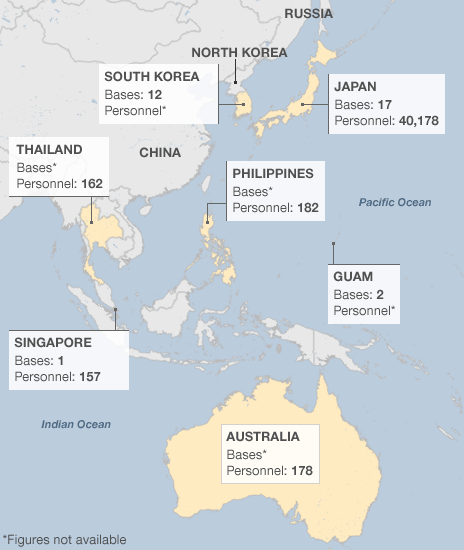The United States is seeking to counter China as a rising military and economic power in Asia-Pacific, as President Obama promised to “make our presence and missions in the Asia-Pacific a top priority.”
After the announcement on Wednesday that up to 2,500 U.S. troops would be permanently stationed in Australia, in addition to an increase of Navy and Air Force capabilities based there as well, Chinese officials responded negatively.

“The U.S. sees a growing threat to its hegemony from China. Therefore, America’s strategic move east is aimed in practical terms at pinning down and containing China and counterbalancing China’s development,” the official Xinhua News Agency said in a commentary.
But maintaining U.S. military and economic hegemony in Asia-Pacific has been a rising concern of the national security establishment for some time now. The U.S. currently has key military bases in South Korea, Japan, the Philippines, Thailand, Singapore, Guam, and now Australia.
In Singapore last June, former Defense Secretary Robert Gates spoke at an International Institute for Strategic Studies meeting and argued for “sustaining a robust [U.S.] military presence in Asia.”
He spoke of overcoming “anti-access and area denial scenarios” that the U.S. military faces in Asia, which threatens America’s access to strategic markets and resources. Predominantly, Gates explained, U.S. military presence in Asia-Pacific is important in “deterring, and if necessary defeating, potential adversaries.”
This articulation of U.S. foreign policy is consistent with grand strategy in the past. As was reiterated in the 2002 National Security Strategy, it was of foremost importance that “our forces will be strong enough to dissuade potential adversaries from pursuing a military build-up in hopes of surpassing, or equaling, the power of the United States.”
Similarly, in former Secretary of Defense William Cohen’s 1999 annual report to President Clinton the crucial task was to “retain the capability to act unilaterally” to prevent “the possibility that a regional great power or global peer competitor may emerge” and to ensure “uninhibited access to key markets, energy supplies, and strategic resources.” Under the subheading Additional Security Concerns was mention of China and its “potential to assert its military power in Asia.”
The U.S. has attempted to inject itself into territorial disputes China has recently had with the Philippines and Taiwan, over island groupings in the South China Sea. Recently retired Chairman of the U.S. Joint Chiefs of Staff Adm. Mike Mullen visited China in July “with a vow to maintain the U.S. military presence in Asia and a warning that recent incidents in the disputed waters of the South China Sea could escalate into conflict.”
In the months prior to that visit China called on the U.S. to stop holding military drills with our allied states like “Taiwan, Vietnam, the Philippines, Malaysia and Brunei,” as they are seen as a provocation. But Mullen responded with a promise that ”the U.S. is not going away. Our enduring presence in this region has been important to our allies for decades and it will continue to be so.”
America’s military relationship with Taiwan, politically separate from mainland China since 1949, but thought by China to be an inalienable part of One China, has long been instigating tensions in the region. Taiwan currently ranks fourth among worldwide recipients of U.S. arms, with the value of deliveries of U.S. defense articles and services to Taiwan totaling $7.5 billion from 2002-2009.
To curb China’s economic competitiveness in the region, Obama has been making trade deals with Asian nations that would give America’s allies some trading privileges that do not immediately extend to China.
But the declining ability of the U.S. to compete in the Asia-Pacific region is not the result of a rising China. Rather, it is the result of a struggling U.S. economy. Still, Washington seems content to use force and military provocation in order to suppress China’s growing strength.


